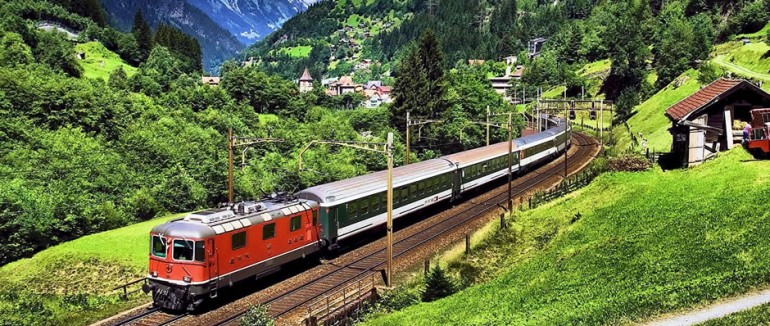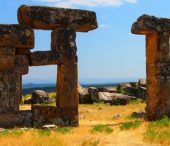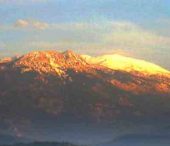If you're travelling by train or bus, expect to be held up at the border for two to three hours – or even longer if your fellow passengers don't have their paperwork in order. You'll usually have to disembark and endure paperwork and baggage checks – on both sides of the border. Security at the crossings to/from countries to the east and southeast (Georgia, Azerbaijan, Iran, Iraq and Syria) is tightest. The process is elongated by a trainload of passengers or the long lines of trucks and cars that build up at some crossings.
Turkey's relationships with most of its neighbours tend to be tense, which can affect when and where you can cross. Check for the most up-to-date information – Lonely Planet's Thorn Tree forum and the Turkish embassy in your country are two sources of information.
Crossing the border into Turkey with your own vehicle should be fairly straightforward, providing your paperwork is in order.
Armenia
At the time of writing, the Turkey–Armenia border was closed.
Bus
Buses run to Tbilisi (Georgia), with connections to Armenia.
Azerbaijan
The remote Borualan–Sadarak crossing, east of Iğdır (Turkey), leads to the Azerbaijani enclave of Nakhichevan, from where you need to fly across Armenian-occupied Nagorno-Karabakh to reach capital Baku and the rest of Azerbaijan.
Bus
Buses run from İstanbul and Trabzon to Baku and to Tbilisi (Georgia), with onward connections to Baku. There are also daily buses from Iğdır to Nakhichevan. The following serve the İstanbul–Baku route:
- Alpar
- Mahmut
- Metro Turizm
- Öznuhoğlu (www.oznuhogluseyahat.com)
Train
The Kars–Tbilisi–Baku line is set to open in 2015.
Bulgaria & Eastern Europe
Bulgarian border guards only occasionally allow pedestrians to cross the frontier; take a bus or hitch a lift with a cooperative motorist. There are three border crossings:
- Kapitan Andreevo–Kapıkule This 24-hour post is the main crossing – and the world's second busiest land border crossing. Located 18km northwest of Edirne (Turkey) on the E80 and 9km from Svilengrad (Bulgaria).
- Lesovo–Hamzabeyli Some 25km northeast of Edirne, this is favoured by big trucks and should be avoided.
- Malko Tǎrnovo–Aziziye Some 70km northeast of Edirne via Kırklareli and 92km south of Burgas (Bulgaria), this is only useful for those heading to Bulgaria's Black Sea resorts.
Bus
Half a dozen companies have daily departures between İstanbul and eastern European destinations including Albania, Bulgaria, Kosovo, Macedonia and Romania. Many use İstanbul's Emniyet Garajı, rather than the main bus station.
- Alpar
- Huntur (www.hunturturizm.com)
- Metro Turizm
- Nișikli (www.nisikli.com.tr)
- Ulusoy
- Varan
- Vardar (www.vardarturizm.com.tr)
Train
The daily Bosfor/Balkan Ekspresi runs from İstanbul to Bucharest (Romania) and Sofia (Bulgaria), with onward connections.
Note that the Turkey–Bulgaria border crossing is in the early hours of the morning and you need to leave the train to get your passport stamped. We've heard stories of harassment, especially of women, at the border, so lone women may be best taking an alternative route. For more information, see The Man in Seat Sixty-One (www.seat61.com/turkey2) and Turkish State Railways.
Georgia
- Sarp The main, 24-hour crossing, on the Black Sea coast between Hopa (Turkey) and Batumi (Georgia).
- Türkgözü Near Posof (Turkey), north of Kars and southwest of Akhaltsikhe (Georgia). The border should open from 8am to 8pm, but in winter you might want to double-check it's open at all.
- Çıldır South of Türkgözü, a new crossing is set to open between here and Ahalkalaki (Georgia), reducing the travel time to Armenia.
Bus
Several bus companies depart from İstanbul, Ankara, Trabzon and other cities to Batumi, Kutaisi and Tbilisi.
- Mahmut İstanbul–Tbilisi daily.
Greece & Western Europe
Greek and Turkish border guards allow you to cross the frontier on foot. The following are open 24 hours.
- Kastanies–Pazarkule About 9km southwest of Edirne.
- Kipi–İpsala Located 29km northeast of Alexandroupolis (Greece) and 35km west of Keşan (Turkey).
Bus
Germany, Austria and Greece have most direct buses to İstanbul, so if you're travelling from other European countries, you'll likely have to catch a connecting bus. Several companies have daily departures for Greece and beyond.
- Derya Tur (www.deryatur.com.tr) Serves Athens (Greece).
- Metro Turizm Destinations including Athens.
- Ulusoy To/from Austria, Germany, Greece and Hungary.
- Varan Austria, Germany, Greece and Hungary.
Car & Motorcycle
The E80 highway makes its way through the Balkans to Edirne and İstanbul, then on to Ankara. Using the car-ferries from Italy and Greece can shorten driving times from Western Europe, but at a price.
From Alexandroupolis, the main road leads to Kipi-İpsala, then to Keşan and east to İstanbul or south to Gallipoli, Çanakkale and the Aegean.
Train
From Western Europe, you will come via Eastern Europe. A suggested route from London to İstanbul is the three-night journey via Paris, Munich, Zagreb, Belgrade and Sofia (or Paris, Munich, Budapest and Bucharest); see www.seat61.com/turkey for more information.
Iran
- Gürbulak–Bazargan This busy post, 35km southeast of Doğubayazıt (Turkey), is open 24 hours.
- Esendere–Sero Southeast of Van, this crossing takes you through the breathtaking scenery of far southeastern Anatolia. It should be open from 8am until midnight, but double-check in winter.
Bus
There are regular buses from İstanbul and Ankara. Thor Tourism (www.thortourism.com) offers three buses a week from Ankara to Tabriz and Tehran.
- From Doğubayazıt Catch a dolmuş to Gürbulak, then walk or catch a shared taxi across the border. It's Iran's busiest border crossing, and Turkey's second busiest. The crossing might take up to an hour, although tourists are normally waved through without much fuss. Change any unused Turkish lira in Bazargan, as it's harder to do so in Tabriz and Tehran. There are onward buses from Bazargan.
- From Van There are direct buses to Orumiyeh (Iran).
Train
For more information visit www.tcdd.gov.tr and www.seat61.com/iran.
- Trans-Asya Ekspresi Leaves Ankara every Wednesday morning and arrives in Tehran on Friday evening, travelling via Van and Tabriz, with a ferry crossing of Lake Van.
- Van–Tabriz (nine hours) Leaves Wednesday evening.
Iraq
Between Silopi (Turkey) and Zahko (Kurdish Iraq), there's no town or village at the Habur–Ibrahim al-Khalil crossing and you can't walk across it.
Bus
There are direct daily buses from Diyarbakır to Dohuk (₺50, six hours) or Erbil (₺60, nine hours) in Kurdish Iraq, and from Cizre.
Taxi
More hassle than the bus, a taxi from Silopi to Zakho costs between US$50 and US$70. Your driver will manoeuvre through a maze of checkpoints and handle the paperwork. On the return journey, watch out for taxi drivers slipping contraband into your bag.
Syria
At the time of writing, advisories warned against all travel to Syria due to the civil war there. Check government travel advice and www.lonelyplanet.com/thorntree for updates.
Read more: http://www.lonelyplanet.com/turkey/transport/getting-there-away/land#ixzz3ziAMinO9






